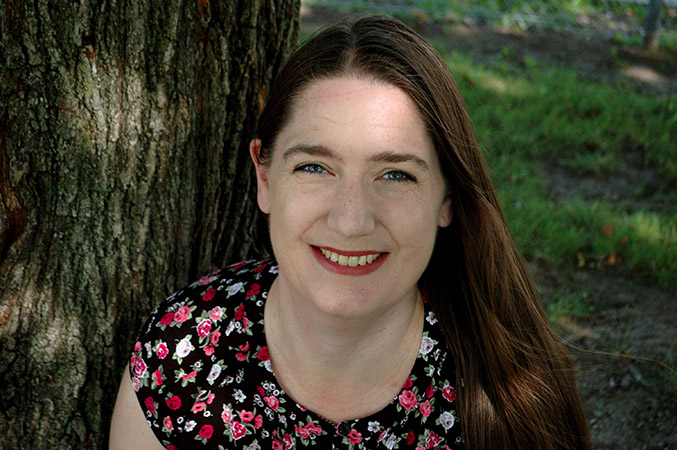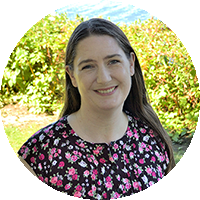Admitted to The Ottawa Hospital in 2017, Anita Descheneau had feelings of hopelessness. For years, dating back to her teens, Anita was seeking help. That help included many years searching for assistance with other healthcare providers, for what she describes as mental and emotional distress — yet she felt left without a clear diagnosis or treatment roadmap.
The mother of four recalls dark times that winter. On the outside, things may have appeared fine. She was physically healthy, exercising, and had simplified her life. Yet despite feeling as if she was doing everything right, she was spiraling downward. By February, Anita arrived at our Emergency Department, and on Family Day weekend she was admitted overnight. Then in March, she was admitted to our acute Mental Health Unit, where she received care for several weeks. “I was in a state of suicidality,” recalls Anita.
“When I came to the hospital, I could not explain how I was feeling at all. Now, after four years, I can articulate how I’m feeling after an investment of huge amounts of individual and group therapy.”
– Anita Descheneau
Diagnosed with borderline personality disorder, and then later also with major depressive disorder, Anita started getting answers to the questions she has had for decades about her mental health. She remembers meeting psychiatrist Dr. Daniel Saul and the confidence he instilled in her — hope that she could get better. “Dr. Saul has been extremely supportive and committed to helping me get well again and to stay out of the hospital. He listens very thoughtfully, continues to encourage, validates me, and gently offers insight,” says Anita.

Today, Anita continues to receive care from our mental health team through different outpatient programs. Looking back, she realizes how far she’s come. “When I came to the hospital, I could not explain how I was feeling at all. Now, after four years, I can articulate how I’m feeling after an investment of huge amounts of individual and group therapy. That says something about the time that they have invested into my life, and that’s something that I’m very grateful for.”
“In my experience, the DBT approach is unique in its ability to validate our patients’ experiences and emotional responses, while also helping them to learn new ways to respond to their challenges.”
– Vicki Larsen
The Ottawa Hospital’s Mental Health program provides early diagnosis and treatment of severe mental illness. We currently have 96 beds for those patients and our hospital is often the first place those experiencing a mental health crisis will turn to for acute care. Group therapies like the Working with Emotion group and Dialectical Behaviour Therapy Skills Group (DBT) provided Anita with the tools and skills she needs each day. Run by psychiatrist, Dr. Christine Dickson, and social worker, Vicki Larsen, DBT and related therapies provide psychological tools in a group setting, including mindfulness and Cognitive Behavioural Therapy (CBT) concepts. This helps manage strong emotions, cope with suicidal impulses, navigate times of crisis, handle the complexities of relationships, and manage feelings of emptiness or an unstable sense of self.
“In my experience, the DBT approach is unique in its ability to validate our patients’ experiences and emotional responses, while also helping them to learn new ways to respond to their challenges. These skills allow them to be more grounded, more confident, and more able to work towards the goals that are important to them,” explains Vicki. “I have definitely seen this kind of growth in Anita; it has been a pleasure to work with someone who does her very best to use the skills that she has learned in DBT.”

“Acknowledging that I know they are truly helping me and how immensely grateful I am, was and is highly important to me.”
– Anita Descheneau
Anita confirms she’s experienced those kinds of results herself. “The DBT groups helped me learn skills and keep using them in the future.” She has learned skills to not only take care of herself, but also to be the mother and wife she wants to be for her four children and husband back home.
Grateful for the exceptional treatment she received, Anita wanted to say thank you to those who played a key role in helping her on her journey. She did so through our Gratitude Award Program — donating in honour of Dr. Saul and Vicki Larsen, who was Anita’s social worker. “Acknowledging that I know they are truly helping me and how immensely grateful I am, was and is highly important to me,” explains Anita.

Q: What inspired you to give to The Ottawa Hospital Foundation?
A: The opportunity to recognize that they are truly helping me and how immensely grateful I am for their consistent wisdom, time, and patience is what inspired me to make a donation.
Q: What is the message you’d like to share about the care you received?
A: I am more than grateful for all the time my care team, including Dr. Saul and Vicki, have given me — patiently listening, gently offering words of wisdom, and reminding me to use my skills.
Q: What did it mean to thank members of your healthcare team through the Gratitude Award Program and to support The Ottawa Hospital at the same time?
A: Beyond my gratitude for them and the entire Mental Health Unit, it is my hope and wish that by supporting The Ottawa Hospital, more funding would result in reaching considerably more patients through the unit, to receive the same exceptional care that I have and continue to receive.
The Ottawa Hospital is a leading academic health, research, and learning hospital proudly affiliated with the University of Ottawa.




